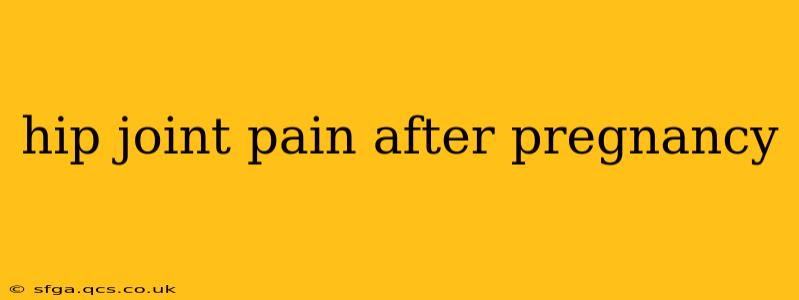Pregnancy and childbirth place immense stress on the body, and often, this manifests as hip joint pain. Many women experience this discomfort, making it a common postpartum concern. This comprehensive guide will delve into the causes, effective treatment options, and preventative measures for hip pain after pregnancy. Understanding the underlying reasons for this pain is crucial for effective management and long-term relief.
What Causes Hip Pain After Pregnancy?
Several factors contribute to hip pain following pregnancy. Hormonal changes, weight gain, and the physical demands of carrying a baby and delivery all play significant roles. Let's explore these in more detail:
-
Relaxin Hormone: During pregnancy, the body produces elevated levels of relaxin, a hormone that loosens ligaments and joints to prepare for childbirth. While beneficial for delivery, this can lead to increased joint instability and pain in the hips, especially the sacroiliac (SI) joint.
-
Weight Gain: The significant weight gain during pregnancy puts added stress on the hips and other weight-bearing joints. This increased load can exacerbate existing conditions or cause new pain.
-
Postural Changes: The shifting center of gravity during pregnancy often results in postural changes, leading to muscle imbalances and strain on the hip joints. This can contribute to pain and discomfort.
-
Diastasis Recti: This separation of abdominal muscles can indirectly affect hip stability and contribute to pain. Weak core muscles often lead to compensatory movement patterns that stress the hip joints.
-
Muscle Weakness: Pregnancy and delivery can weaken the muscles supporting the hips and pelvis, making them more susceptible to injury and pain.
-
Previous Injuries: Existing hip conditions or injuries can be aggravated during pregnancy and postpartum.
Is Hip Pain After Pregnancy Normal?
While experiencing some level of discomfort after pregnancy is common, persistent or severe hip pain is not necessarily "normal." Many women experience mild aches and pains, but significant pain impacting daily activities warrants medical attention. It's crucial to differentiate between typical postpartum discomfort and a potentially serious condition requiring professional assessment.
How Is Hip Pain After Pregnancy Treated?
Treatment options for hip pain after pregnancy vary depending on the severity and underlying cause. Common approaches include:
-
Physical Therapy: This is often the first line of treatment. A physical therapist can develop a personalized exercise program to strengthen core and hip muscles, improve posture, and reduce pain. Techniques such as manual therapy and stretches may also be employed.
-
Medication: Over-the-counter pain relievers like ibuprofen or acetaminophen can help manage pain and inflammation. In some cases, a doctor may prescribe stronger medications.
-
Chiropractic Care: Chiropractic adjustments can help realign the pelvis and spine, improving joint function and reducing pain.
-
Rest and Ice: Resting the affected area and applying ice packs can help reduce inflammation and pain.
-
Corticosteroid Injections: In cases of severe inflammation, corticosteroid injections may be considered. This should be done under medical supervision.
What Exercises Help with Hip Pain After Pregnancy?
Gentle exercise is crucial for managing hip pain after pregnancy. However, it's essential to start slowly and consult with a physical therapist or healthcare professional to develop a safe and effective exercise plan. Some common exercises include:
- Pelvic Tilts: Strengthening core muscles.
- Glute Bridges: Strengthening the glutes and improving hip stability.
- Side-lying Hip Abduction: Strengthening hip abductor muscles.
- Cat-Cow Stretch: Improving spinal mobility and reducing tension.
How Can I Prevent Hip Pain After Pregnancy?
Preventing hip pain after pregnancy involves a proactive approach before, during, and after delivery. This includes:
- Maintaining a Healthy Weight: Avoiding excessive weight gain during pregnancy.
- Regular Exercise: Engaging in safe and moderate exercise throughout pregnancy and postpartum, under medical guidance.
- Proper Posture: Maintaining good posture during pregnancy and while breastfeeding.
- Pelvic Floor Exercises: Strengthening pelvic floor muscles to support hip stability.
- Core Strengthening: Focusing on core exercises to improve stability and reduce strain on the hips.
Can Hip Pain After Pregnancy Last for Months or Years?
While many women experience resolution of hip pain within a few months postpartum, some may experience persistent pain for longer periods. The duration depends on several factors, including the severity of the underlying condition, the effectiveness of treatment, and individual healing rates. If hip pain persists for an extended time, it's essential to seek medical attention to rule out any underlying conditions and develop a long-term management plan.
This information is for general knowledge and does not constitute medical advice. Always consult with a healthcare professional for diagnosis and treatment of hip pain after pregnancy. They can provide personalized guidance based on your specific circumstances and medical history.
